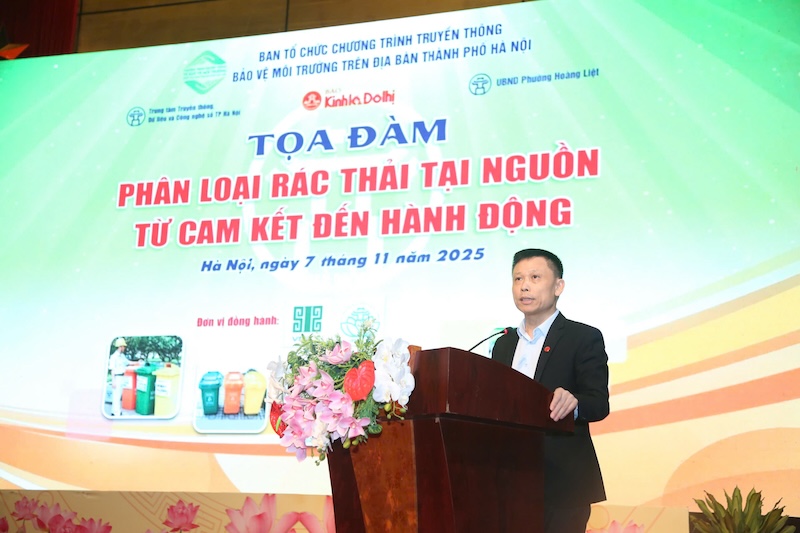On the morning of November 7, Kinh Ton & do thi Newspaper in collaboration with the People's Committee of Hoang Liet Ward (Hanoi) organized a seminar with the theme "Waste classification at source, from commitment to action". The event attracted the participation of city leaders, environmental experts, businesses and a large number of people.
In his opening speech, Associate Professor, Dr. Nguyen Thanh Loi - Editor-in-Chief of Kinh Thoi & Do thi Newspaper emphasized that the Law on Environmental Protection 2020 requires households to classify waste from January 1, 2025. This is a progressive regulation, but from commitment to practical action it is still a challenging journey.
In many places, people want to do it but lack instructions, the grassroots government lacks mechanisms, while the infrastructure for collection and transportation is not yet synchronous. The seminar is an open forum to find solutions to the question: how to make waste truly classified, not just on paper?" - Mr. Loi raised the issue.

This reality is clearly demonstrated through the sharing of the unit directly implementing. Mr. Bui Ngoc Tu - Head of the Technology Department, Hanoi Urban Environment Company Limited (URENCO) said that the unit is ready in terms of policy and action. URENCO has pioneered the pilot classification of waste into 4 groups (recycling, bulky, hazardous, remaining) in 5 central areas of the city and invested in more than 40 modern vehicles, while training human resources to meet the new process.
However, Mr. Tu also frankly pointed out that three major difficulties are the main barriers. First, the reception and processing infrastructure is not synchronous. There are still gaps in collection points and transit stations suitable for each type of waste after classification, especially in inner-city areas due to limited land funds. Second, people's awareness and habits are not stable. The situation of littering at the wrong time and place is still common, making efforts to classify in some places meaningless.
Third, the collection and transportation unit has not been adjusted appropriately. "There is currently no new unit price applied to waste after classification. The current unit price for maintaining environmental sanitation has not been calculated correctly and fully, causing difficulties for businesses in investing and operating," Mr. Tu shared.
Agreeing with the above bottlenecks, experts say that the prerequisite for successful waste classification is to ensure that the waste classified is not mixed together. Dr. Hoang Duong Tung, Chairman of the Vietnam Clean Air Network, said that the immediate action is to reorganize the collection system with vehicles, bins and separate routes for each type of waste. Only when infrastructure goes first and people go behind will the policy truly come into life.
Many opinions at the seminar suggested that Hanoi needs to have a "conductor" who is the city government to coordinate synchronously, and at the same time pilot models in some wards and residential areas before expanding. In addition, it is necessary to link classification with specific economic benefits such as reducing cleaning fees and accumulating bonus points to encourage people to participate voluntarily and sustainably.











